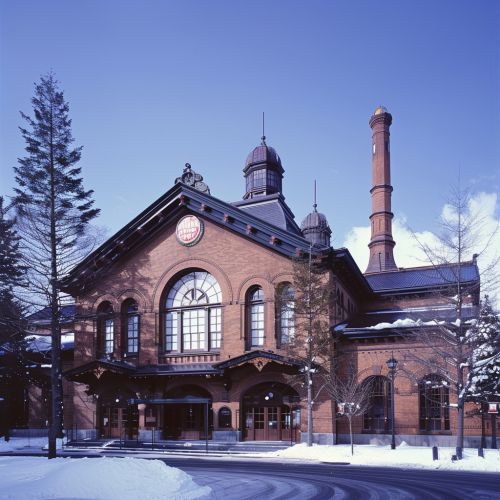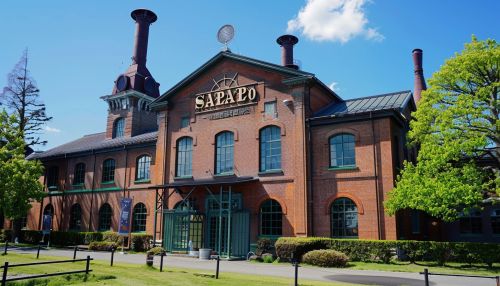Sapporo Breweries: Difference between revisions
(Created page with "== History == Sapporo Breweries Ltd. is one of the oldest and most prominent beer producers in Japan. Established in 1876, the company has a rich history that traces back to the early days of Japan's modernization during the Meiji Restoration. The brewery was founded by Seibei Nakagawa, who studied brewing techniques in Germany before returning to Japan to establish the first brewery in Sapporo, Hokkaido. This initiative was part of the government's efforts to moder...") |
No edit summary |
||
| Line 5: | Line 5: | ||
The company's first beer, Sapporo Lager, was brewed in 1877 and quickly gained popularity. The brewery's success led to the establishment of additional breweries and the expansion of its product line. By the early 20th century, Sapporo Breweries had become a major player in the Japanese beer market. | The company's first beer, Sapporo Lager, was brewed in 1877 and quickly gained popularity. The brewery's success led to the establishment of additional breweries and the expansion of its product line. By the early 20th century, Sapporo Breweries had become a major player in the Japanese beer market. | ||
[[Image:Detail-91799.jpg|thumb|center|Exterior view of the original Sapporo Brewery building in Hokkaido, Japan.|class=only_on_mobile]] | |||
[[Image:Detail-91800.jpg|thumb|center|Exterior view of the original Sapporo Brewery building in Hokkaido, Japan.|class=only_on_desktop]] | |||
== Expansion and Modernization == | == Expansion and Modernization == | ||
Latest revision as of 14:41, 19 June 2024
History
Sapporo Breweries Ltd. is one of the oldest and most prominent beer producers in Japan. Established in 1876, the company has a rich history that traces back to the early days of Japan's modernization during the Meiji Restoration. The brewery was founded by Seibei Nakagawa, who studied brewing techniques in Germany before returning to Japan to establish the first brewery in Sapporo, Hokkaido. This initiative was part of the government's efforts to modernize the country and introduce Western technologies and industries.
The company's first beer, Sapporo Lager, was brewed in 1877 and quickly gained popularity. The brewery's success led to the establishment of additional breweries and the expansion of its product line. By the early 20th century, Sapporo Breweries had become a major player in the Japanese beer market.


Expansion and Modernization
In the post-World War II era, Sapporo Breweries underwent significant expansion and modernization. The company invested in new brewing technologies and facilities, allowing it to increase production and improve the quality of its beer. During this period, Sapporo also began exporting its products to international markets, establishing itself as a global brand.
The 1960s and 1970s saw further growth, with the introduction of new products such as Sapporo Draft Beer and Sapporo Black Label. These products were well-received by consumers and helped to solidify the company's reputation for quality and innovation. Sapporo Breweries also expanded its operations by acquiring other breweries and beverage companies, further increasing its market share.
Product Line
Sapporo Breweries offers a diverse range of products, catering to various consumer preferences. The company's flagship product is Sapporo Premium Beer, a pale lager known for its crisp, clean taste and distinctive packaging. Other popular products include:
- **Sapporo Black Label**: A dark lager with a rich, malty flavor.
- **Sapporo Yebisu**: A premium beer brand that includes several varieties, such as Yebisu Premium and Yebisu Black.
- **Sapporo Draft Beer**: A light, refreshing beer that is popular in Japan and abroad.
- **Sapporo Reserve**: A premium beer made with select ingredients for a smooth, refined taste.
In addition to its core beer products, Sapporo Breweries also produces a range of other beverages, including non-alcoholic beers, soft drinks, and spirits. The company is committed to innovation and regularly introduces new products to meet changing consumer tastes and preferences.
Brewing Process
Sapporo Breweries employs a meticulous brewing process to ensure the highest quality of its products. The process begins with the selection of premium ingredients, including malted barley, hops, and water. The ingredients are carefully sourced and tested to meet the company's stringent quality standards.
The brewing process involves several key steps:
- **Mashing**: The malted barley is mixed with hot water to create a mash, which converts the starches into fermentable sugars.
- **Lautering**: The mash is then transferred to a lauter tun, where the liquid wort is separated from the solid grain husks.
- **Boiling**: The wort is boiled and hops are added to impart bitterness, flavor, and aroma to the beer.
- **Fermentation**: The boiled wort is cooled and transferred to fermentation tanks, where yeast is added to convert the sugars into alcohol and carbon dioxide.
- **Maturation**: The beer is aged in tanks to allow the flavors to develop and mature.
- **Packaging**: The finished beer is filtered, carbonated, and packaged in bottles, cans, or kegs for distribution.
Throughout the brewing process, Sapporo Breweries employs advanced quality control measures to ensure consistency and excellence in every batch of beer.
Sustainability and Corporate Responsibility
Sapporo Breweries is committed to sustainability and corporate responsibility. The company has implemented various initiatives to reduce its environmental impact and promote social responsibility. These initiatives include:
- **Energy Efficiency**: Sapporo Breweries has invested in energy-efficient technologies and practices to reduce its carbon footprint. This includes the use of renewable energy sources and the implementation of energy-saving measures in its brewing facilities.
- **Water Conservation**: The company has implemented water-saving technologies and practices to reduce water consumption in its brewing process. This includes the use of advanced filtration systems and the recycling of wastewater.
- **Waste Reduction**: Sapporo Breweries has implemented waste reduction initiatives to minimize the amount of waste generated by its operations. This includes the recycling of packaging materials and the use of biodegradable materials.
- **Community Engagement**: The company is actively involved in supporting local communities through various initiatives, such as sponsoring cultural events and providing financial support to local organizations.
Global Presence
Sapporo Breweries has a strong global presence, with its products available in over 40 countries worldwide. The company has established a network of subsidiaries and distributors to support its international operations. Key markets for Sapporo Breweries include North America, Europe, and Asia.
In North America, Sapporo Breweries operates through its subsidiary, Sapporo U.S.A., which was established in 1984. The company has a strong presence in the United States and Canada, where its products are widely available in retail stores, bars, and restaurants.
In Europe, Sapporo Breweries has established a presence through its subsidiary, Sapporo Europe, which was established in 1990. The company has a growing market share in several European countries, including the United Kingdom, Germany, and France.
In Asia, Sapporo Breweries has a strong presence in several key markets, including China, South Korea, and Taiwan. The company has established partnerships with local distributors to support its operations in these markets.
Research and Development
Sapporo Breweries places a strong emphasis on research and development (R&D) to drive innovation and maintain its competitive edge. The company has established a dedicated R&D center, where it conducts research on various aspects of brewing, including ingredient selection, brewing techniques, and product development.
Key areas of focus for Sapporo Breweries' R&D efforts include:
- **Ingredient Innovation**: The company is constantly exploring new ingredients and brewing techniques to create unique and innovative products. This includes the development of new hop varieties and the use of alternative grains.
- **Quality Improvement**: Sapporo Breweries is committed to improving the quality of its products through continuous research and development. This includes the implementation of advanced quality control measures and the development of new brewing technologies.
- **Sustainability**: The company is actively researching ways to reduce its environmental impact and promote sustainability. This includes the development of energy-efficient brewing technologies and the use of renewable energy sources.
Awards and Recognition
Sapporo Breweries has received numerous awards and accolades for its products and operations. The company's beers have been recognized for their quality and taste at various international beer competitions, including the World Beer Cup and the International Brewing Awards.
In addition to product awards, Sapporo Breweries has also been recognized for its commitment to sustainability and corporate responsibility. The company has received several awards for its environmental initiatives, including the Green Brewery Award and the Eco-Action Award.
Future Outlook
Sapporo Breweries is well-positioned for future growth and success. The company is committed to maintaining its focus on quality, innovation, and sustainability. Key areas of focus for the future include:
- **Product Innovation**: Sapporo Breweries will continue to invest in research and development to create new and innovative products that meet changing consumer preferences.
- **Market Expansion**: The company will continue to expand its presence in international markets, with a focus on key growth regions such as Asia and North America.
- **Sustainability**: Sapporo Breweries will continue to implement initiatives to reduce its environmental impact and promote sustainability. This includes the use of renewable energy sources and the implementation of energy-efficient technologies.
See Also
- Beer in Japan
- Meiji Restoration
- Brewing
- Hops
- Malted barley
- Fermentation
- Carbon footprint
- Renewable energy
